Fighting the invisible prison: Artist and photographer Ai Weiwei joins forces with Reporters Without Borders
posted Friday, November 8, 2013 at 10:32 AM EDT
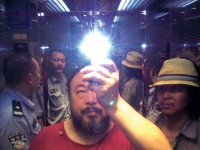
In the David and Goliath battle pitting the dissident artist, photographer and blackjack player Ai Weiwei against the Chinese government, it's clearly an uneven match -- the artist is mostly winning. Weiwei is both China's foremost contemporary artist, boasting a huge international following, as well as its most vocal and recognizable critic.
His activist art has taken many forms, from installation art to photography, cinema to architecture, and most recently to music videos. Ai Weiwei is a man of extraordinary personal courage, a force of nature fighting the censorship and repression of the Chinese government. When the government does something to censor or shut him down, he responds with courage and efforts to point out the absurdity of it all.
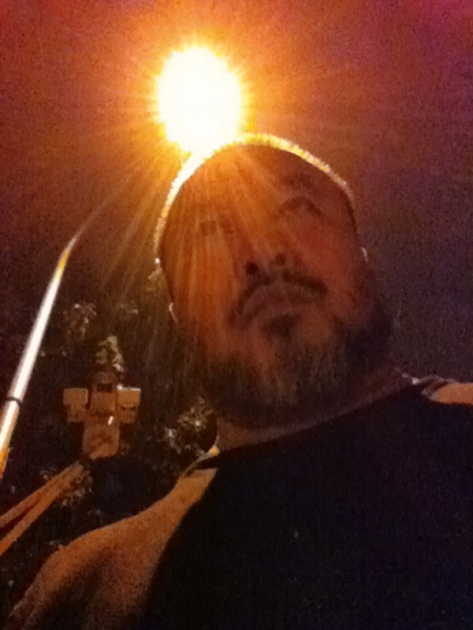
Surveillance camera outside the studio gate 2011-8-29 10:19pm
Photo by Ai Weiwei
Braving repression and censorship
Like Weiwei, there are thousands of reporters and journalists who daily demonstrate extraordinary courage in the face of repression and censorship. In 1985, Reporters Without Borders (aka, Reporters Sans Frontières) was founded in Montpellier, France, by four journalists: Robert Ménard*, Rémy Loury, Jacques Molénat and Émilien Jubineau to support reporters and to protect press freedom. However, since its founding the world has changed, and RSF has extended its mandate to include supporting the work of "netizens" and working to support freedom of information.
As one of its fundraising efforts every year RSF produces several photo albums as part of a series the organization calls "100 Photos for Press Freedom." There are about 40 editions of the "100 Photos" series to date, with photographers like Don McCullin, William Klein, Steve McCurry and René Burri, contributing their images.
RSF uses its funds to publicize the injustices reporters face, and at times to support them with financial and legal aid. Sometimes it even provides a safe haven. I know about this first hand.
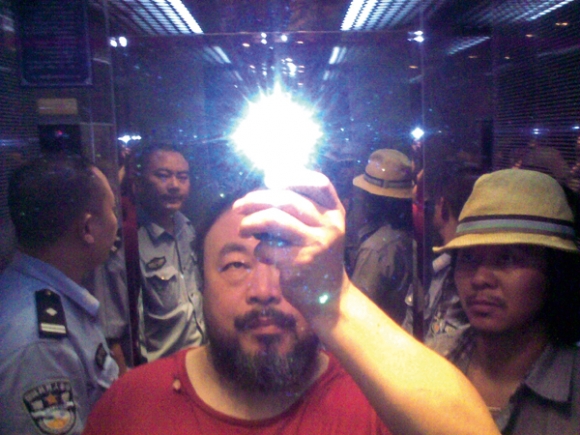
Ai Weiwei in the elevator when taken into custody by the police, August 2009, Sichuan, China
Photo by Ai Weiwei
...And sometimes even prison and death
A few years ago, on a cold October day I sat in a café across from my friend, the "Oracle." She's a journalist who once worked in America and now lives in Europe. She helps set up safe houses for journalists fleeing arrest and/or possible assassination. The guests stay in the safe house until things cool off or until it's time to move on. That fall morning the Oracle sat cradling her teacup in her hands, trying to warm them up. Usually she's very talkative, but she was very quiet. When I asked her what was wrong, she said simply, "We lost one." She meant, of course, that someone she had been expecting to help had been arrested -- or worse, killed before reaching safety.
Violence against journalists has become commonplace, happening more and more**. RSF tracks the numbers, and it looks like 2013 will be another brutal year for them, with half a dozen photographers and 45 reporters already dead. Additionally, RSF counted some 183 journalists in prison, 98 of whom are in China.
So it was clearly only a matter of time before Ai Weiwei and RSF would join forces.
China's "invisible prison" of the mind
For the new RSF book, "100 Photos by Ai Weiwei for Press Freedom," Weiwei has contributed 70 photographs which have never been published before, in addition to 30 others that have. These images record life in China's "invisible prison" of the mind. As the world's largest surveillance state, Chinese censorship and control of information is so pervasive that large parts of the population simply accept what they are told. Ai Weiwei sees himself as fighting to free the Chinese from this self-imposed imprisonment of thought. As he puts it, "Liberty is about our right to question everything."
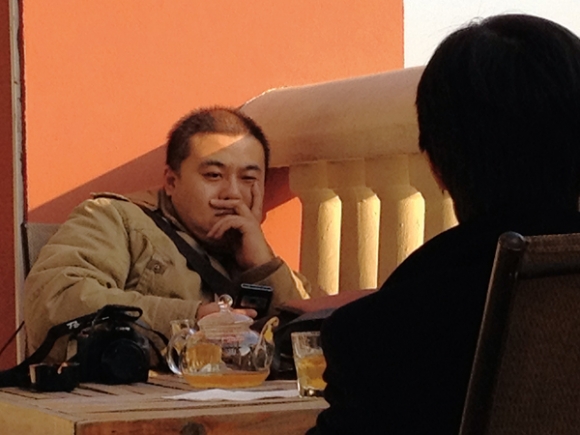
Spying from a bookstore above Chaoyang Park 2011-12-11 2:35pm
Photo by Ai Weiwei
In his "100 Photos" album, Weiwei's images serve as a record of the banality of evil and his response to it. In one series of images, for instance, a couple sits across a restaurant terrace from Weiwei, the young man nonchalantly playing with his phone. When he finally raises it to take a picture of his date, he instead aims at the artist -- only to discover to his dismay that Weiwei has already been photographing him.
Remarkable courage and sense of humor
Weiwei's courage is remarkable, and he seems to remain serene throughout his storm of surveillance and oppression. On one occasion, he was arrested and beaten so badly by the police that he had to be flown to Munich for emergency surgery for a cerebral hemorrhage. His photographic souvenir of this life-threatening event? The X-rays of his injuries, which he published in "100 Photos."
A few years ago, when the police surrounded his Shanghai studio with surveillance cameras, Weiwei decorated the cameras with brightly colored Chinese lanterns. Then to demonstrate his disdain for the surveillance, he put his own cameras up in his studio and his bedroom, and then recorded his daily life and posted it on the Web for all to see, thus outsurveilling his surveillers and satirizing their efforts.
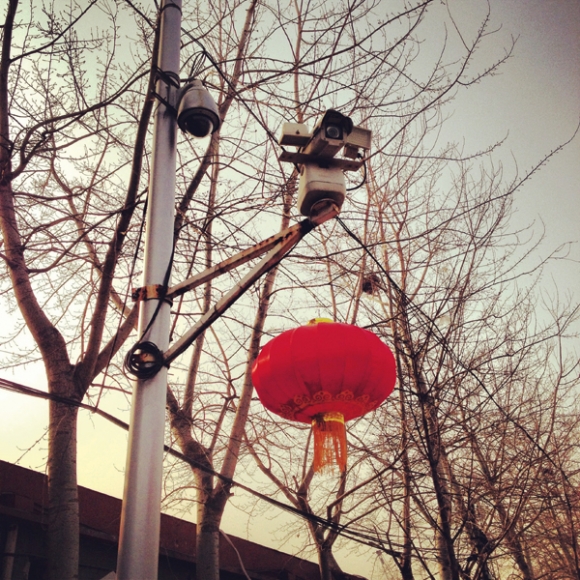
Lantern at the studio gate 2013-1-10
Photo by Ai Weiwei
Wetwei started blogging in 2005, and when his blog was taken down by the authorities in 2009, he turned to Twitter (@aiww) to express his opinions. Then earlier this year, Weiwei turned to music video as a form of protest. He produced and starred in a music video titled "Dumbass", yet another way to parody his prison experiences.
"100 Photos for Press Freedom by Ai Weiwei" is published in English and in French, and was released this fall. Partly supported by a crowd-funding campaign on KissKissBankBank, the book is currently available in an English digital version at the iTunes App Store. You can support Reporters Without Borders and do your bit to protect press freedom and freedom of information by buying yourself a copy of Ai Weiwei's "100 Photos," which costs about $15 in the U.S. You can also go to the RSF website and request it -- or any of the other "100 Photos" albums -- directly from the organization.
It's the least any of us can do to support press freedom and it doesn't take that much courage.
Want to learn more about Ai Weiwei? Check out these YouTube videos:
Louisiana Talks interview (Ai Weiwei speaks in English about his work)
Story Footnotes:
*In an incredibly strange and ironic move, Reporters Without Borders founder Robert Ménard is running for Mayor of the city of Béziers, France, on the ultra-right wing Front National party ticket of Marine Le Pen.
**The world has become increasingly dangerous for journalists. On Nov. 2, two Radio France International journalists, Ghislaine Dupont and Claude Verlon, were kidnapped and murdered in cold blood by a small group of armed men in northern Mali. This killing reflects a change. Journalists who were once seen as neutral observers and whose neutrality was a safeguard, are more and more being seen as targets.
All photos used with permission of Ai Weiwei and Reporters Without Borders.